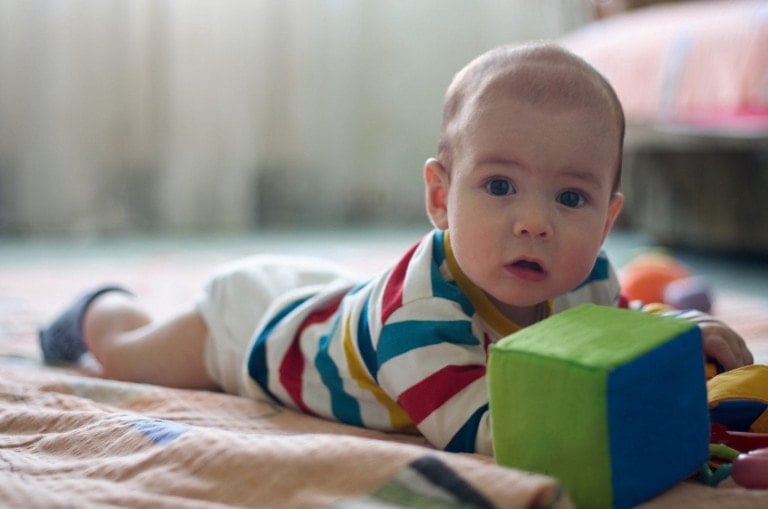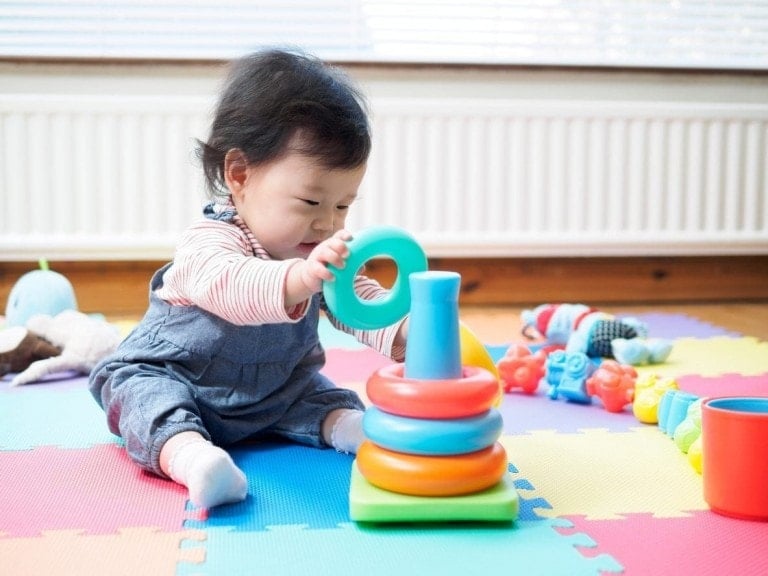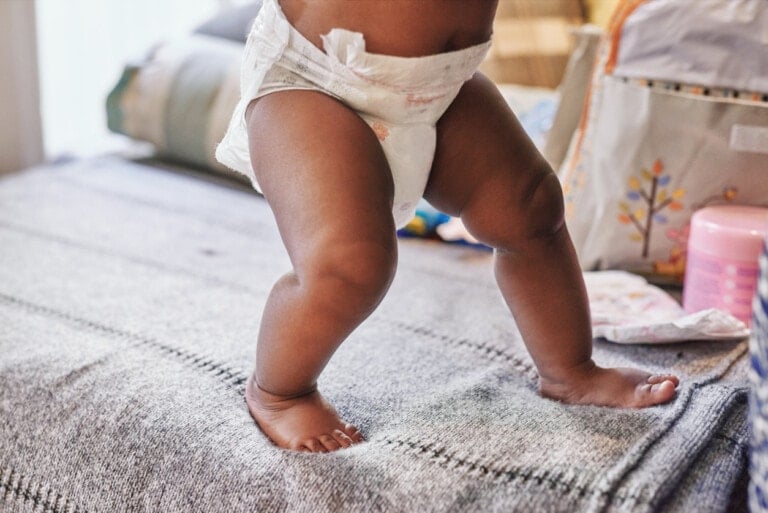It’s hard to believe your baby is now 8 months old! Watching them reach this age is incredibly exciting but can also bring about some questions. Many new parents wonder what developmental milestones their 8-month-old will reach, what types of solid foods their baby can eat, and the average weight for this age. They may also wonder how long their 8-month-old baby’s wake window is, what their eating, sleeping, and nap schedules will look like, and what activities they can do together. This article will cover those topics and many more, so no need to worry — we’ve got you covered!
8-Month Developmental Milestones
Eight months marks a steep and rapid growth period regarding your baby’s milestones. They will begin working toward crawling and walking, along with growing socially. Your 8-month-old’s new developmental milestones include:1,2
- Rolling from back to front and back again
- Sitting without support
- Scooting and rocking back and forth when they’re on their hands and knees
- Pulling up to stand
- Moving objects from one hand to the other
- Pulling objects closer using a raking motion
- Using their thumb and forefinger (pincer grasp) to pick up toys and food
- Repeating sounds and engaging with caregivers by laughing and squealing
- Experiencing shyness or crying around strangers
- Waving, throwing, and dropping objects to learn their function
8-Month-Old Feeding Schedule
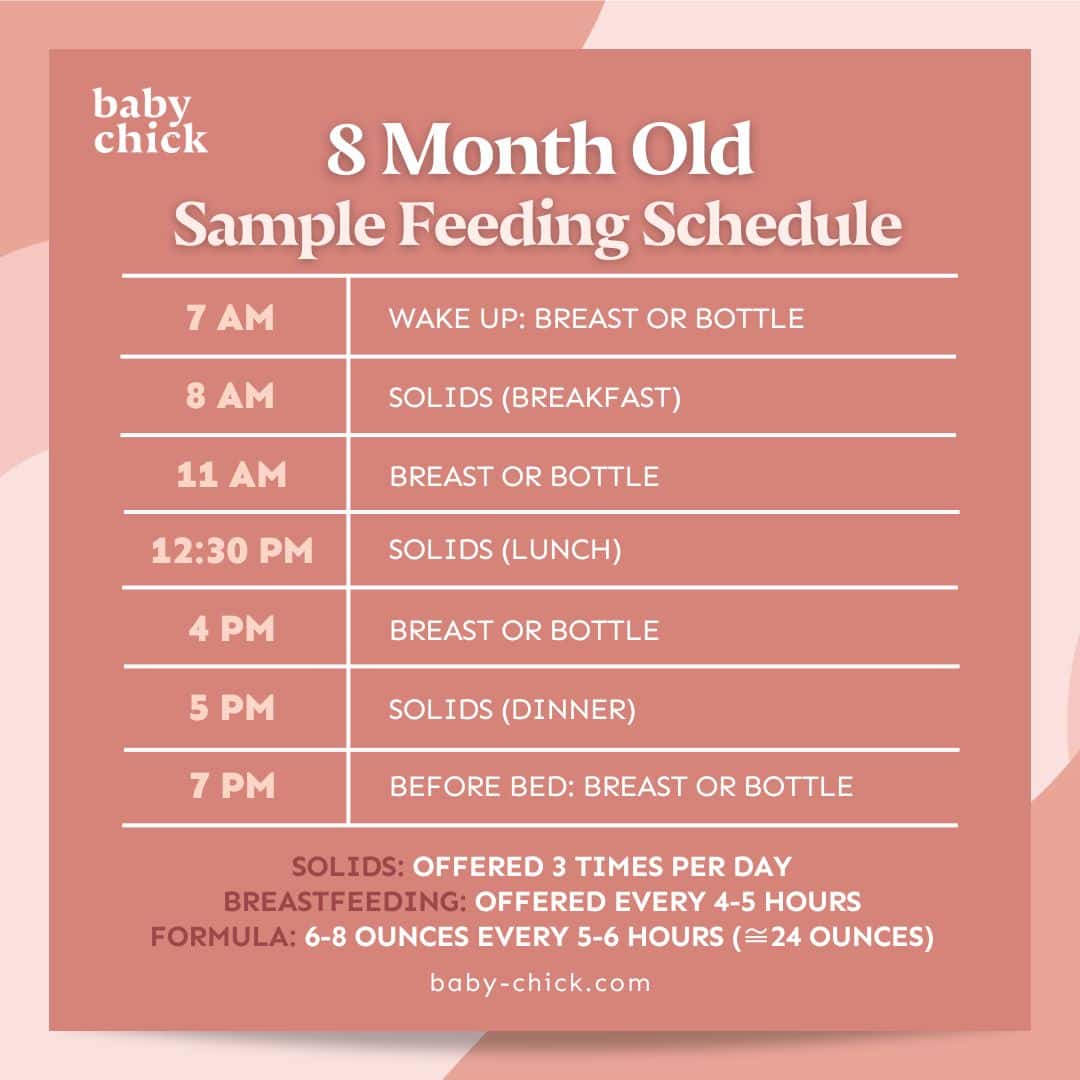
As your baby grows, their appetite will also grow. They will eat solid foods three times a day, mimicking their caregivers’ breakfast, lunch, and dinner.3 While breast milk and/or formula will continue to provide most of your baby’s nutrients, introducing a wide variety of fruits, vegetables, pasteurized dairy, and proteins will provide extra nutrients.3 If you’re wondering how much formula an 8-month-old should have, the American Academy of Pediatrics recommends about 24 ounces per day, with about 4-6 ounces for each feeding.15
Recommended Foods
It’s important to offer your baby foods that are easy to eat, such as purees (mashed with a few lumps) and soft-cooked veggies.3 At this age, if they’ve mastered purees and are bringing their hands to their mouth, they can move on to finger foods, such as mashed banana, ripe avocado, scrambled eggs, etc.13 Offering iron-fortified baby cereals is also an excellent option; however, the cereal should not be added to your baby’s bottle unless directed by your doctor.4
Introducing New Foods
While many parents may want to offer their baby a wide variety of new foods right away, you must introduce one new food at a time. Wait a few days before introducing a new one. This will give you time to notice if your baby has any possible food allergy symptoms. Signs your baby is reacting to a new food include:4
- Rash
- Diarrhea/vomiting
- Trouble breathing
- Hives
If your baby is experiencing trouble breathing, seek immediate medical attention.
While many parents believe they can prevent food allergies by not introducing high-allergen foods into their baby’s diet, the opposite is true. Introducing high-allergen foods such as wheat, soy, peanuts, eggs, milk, and nuts doesn’t decrease the likelihood of your baby developing a food allergy. Remember to introduce one new food at a time and monitor their tolerance!4
What Foods To Avoid
While many babies enjoy a wide variety of solid foods, there are a few foods all babies should avoid:4
- Foods with added sugar or no-calorie sweeteners
- High-sodium foods
- Honey and any foods containing honey
- Unpasteurized juice or dairy products
- Choking hazards such as hot dogs, uncooked carrots, grapes, popcorn, and nuts
8-Month-Old Sleep Schedule
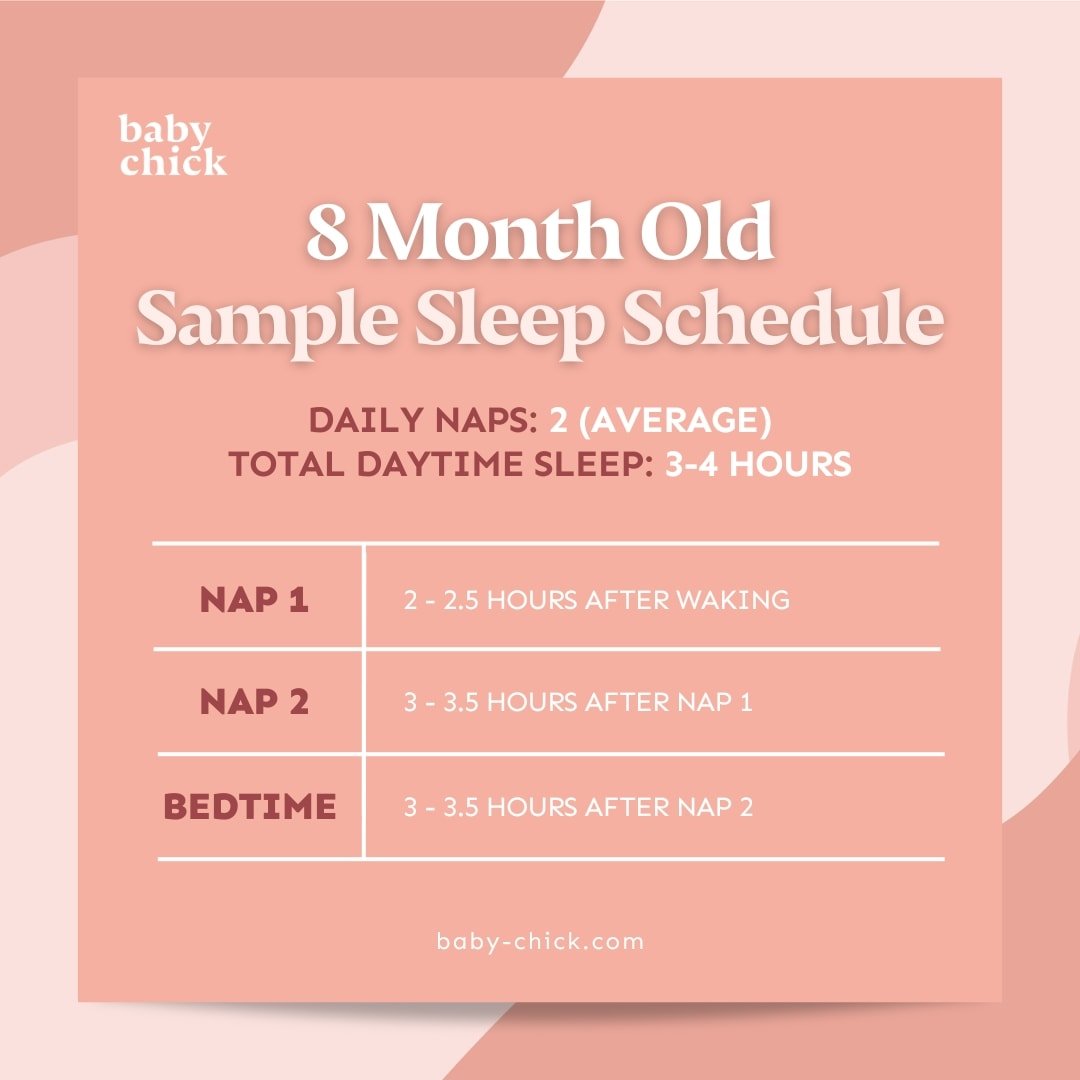
During this period, your baby’s sleep won’t look very different from a month ago. Your 8-month-old still needs 12-16 hours of sleep daily, and their schedule will typically include taking two naps that last one and a half to two hours each.5
Some babies will experience periods when getting to sleep and staying asleep can be difficult, and parents may wonder if there are ways to do sleep training for their 8-month-old. Many babies experience difficulty sleeping due to being overstimulated close to bedtime, so instituting quiet time before bed can help.6 It’s important to remember that daytime is for playtime, so limit any overstimulating play close to bedtime. You can also try putting your little one to bed while they’re drowsy but not fully asleep. This will help them learn to fall asleep on their own.6
Daily Schedule
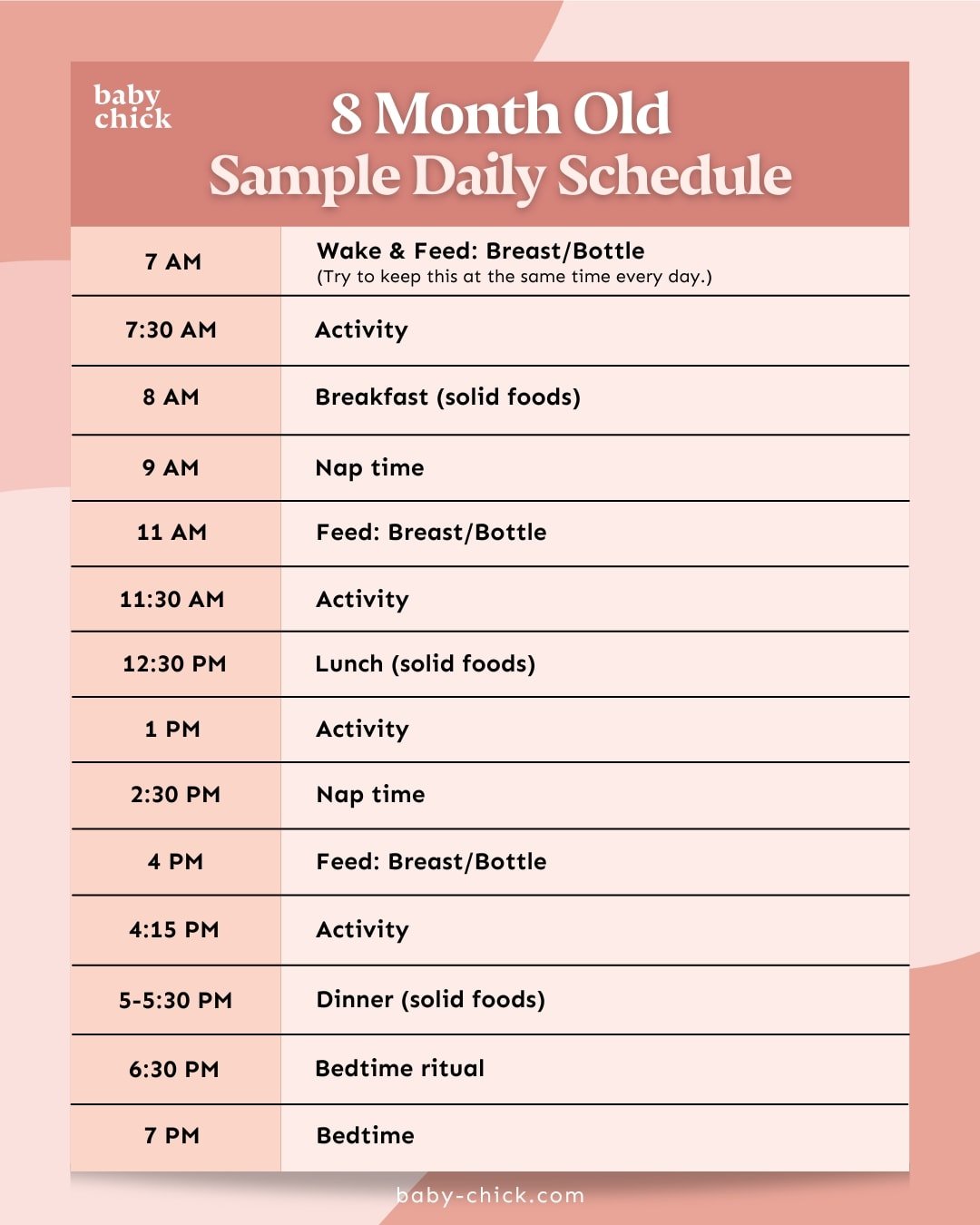
If your 8-month-old is experiencing difficulty with sleep, it’s vital to stick to a consistent daily playtime and nap schedule. Many 8-month-olds will still take two naps daily, one in the morning and one in the afternoon, with a wake window of around two to three hours.7 Each baby’s naptimes and bedtimes look different, but here’s a sample sleep schedule to give you an idea of what their schedule should look like:7
- 7-7:30 a.m. — Wake up for the day
- 9-9:30 a.m. — First nap of the day (it should last one to two hours)
- 2-2:30 p.m. — Second nap of the day (it should also last one to two hours)
- 7-8 p.m. — Bedtime
It’s recommended to wake your baby by 4 p.m., as sleeping longer can cause them to have a difficult time falling asleep at bedtime. Aiming for a bedtime 10-12 hours before your baby wakes for the day is also recommended. This will guarantee your baby is getting enough sleep.7
Health Concerns to Watch Out For
There’s usually no scheduled well-baby checkup during this period, but there are still a few things to watch for regarding your little one’s health. The average weight of an 8-month-old boy is 17.5-22 pounds, and the average 8-month-old girl will weigh about half a pound less. Remember, these are just averages; your 8-month-old’s weight may be more or less depending on their growth history.10 Also, weighing baby yourself at home can be inaccurate, so make sure to have your doctor do it!
Your baby will experience their world with their mouths, making them prone to common childhood illnesses you probably experienced as a child. These include:9
- Colds with a runny nose, sneezing, congestion, and cough
- Diarrhea and vomiting caused by viruses
- Ear infections
- Hand-foot-mouth disease (where sores develop in the mouth, the palms of the hands, and the soles of the feet)
While many babies can get over these common illnesses without any trouble, there are a few signs and symptoms you need to watch for. If your baby is experiencing any of these symptoms, please seek immediate medical attention:9
- Fever lasting longer than three days
- Ear pain
- Difficulty breathing
- Change in attitude, such as increased irritability or lethargy
- Dehydration (cracked lips, decreased wet diapers, and decreased tears)
Your 8-month-old baby should receive their annual flu vaccine during cold and flu season. This vaccine is recommended for any baby over 6 months old and should be given before the end of October. It will help provide your baby with protection from the flu.8
Activities for 8-Month-Olds

Playing and engaging with your baby is vital to their development and a wonderful bonding experience between you two. Playtime will mainly focus on social interactions and exploration at this age. Here are some activities you can do with your 8-month-old:11,12
- Sing fun songs and include actions for your baby to copy
- Provide toys in various shapes, sizes, colors, and textures
- Play peek-a-boo
- Provide toys that move or make noise when your baby interacts with them
- Place a toy just out of their reach for them to grab
- Read to your baby daily
Safety Tips
As your baby gains mobility and curiosity, it’s crucial to maintain a safe play space for them. The following tips will give you some ideas on how to make their play area safe:1,14
- Remove all small objects from their reach
- Place gates on stairways
- Place window guards on all windows
- Move their crib away from any windows
It’s also important to keep your baby safe in other areas of your home and when they’re out of the house. This includes:14
- Not keeping hot foods or beverages within their reach
- Not leaving them unattended in the bathtub
- Removing all water from the tub after bath time is over
- Using a properly installed rear-facing car seat in all vehicles
As your 8-month-old baby moves through this new month of life, they will experience periods of rapid developmental growth and reach new milestones as their personalities flourish. Using this time to engage with your baby throughout the day will give them the best foot forward as they continue to explore and discover all the exciting things around them.

























